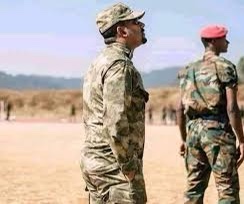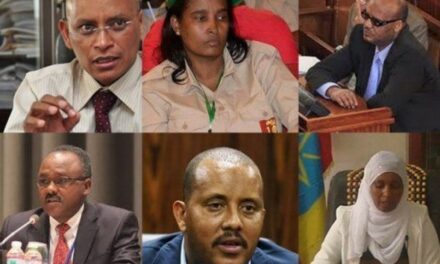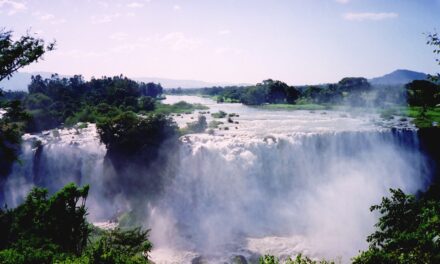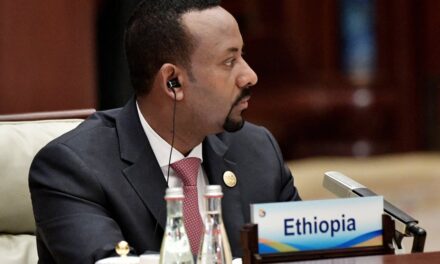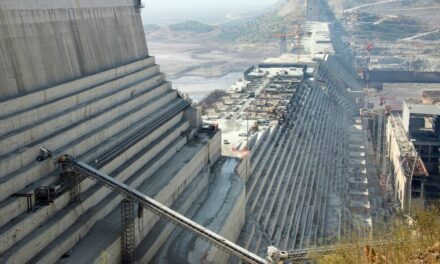By: Yohannes Gedamu (Ph.D.)
Ethiopia’s three Northern regions of Tigray, Afar and Amhara continue to be devastated by the ongoing war in the country. The human cost from this conflict is growing.
Millions from these regions remain internally displaced. The economic cost of the war may end up causing a lasting negative impact on the country’s political and socio-economic dynamics for so long.
TPLF, the Culprit
Majority Ethiopians’ believe that if it was not for the Tigrayan political elites’ thirst for political power and an incomprehensible and false sense of superiority that they think allows to do anything, this war may have been avoided. Indeed, all the mediation efforts attempted by religious leaders, elders from all ethnicities and parts of the country, notable individuals and the federal government itself have all failed.
Obviously, the war started when the Tigrayan members of the ENDF together with TPLF’s (Tigray Peoples’ Liberation Front) special police forces and militias launched a deliberate attack against the Northern Command of Ethiopia’s army (ENDF).
The war is now more than a year old and has seen many twists and turns. Especially following the defeat of the Tigrayan forces in late 2020 and the capture of Mekelle and greater Tigray by ENDF and allied armies, many hoped that the provisional administration that was led by a group of Tigrayan political elites that supported the federal government’s then law enforcement mission were set to help stabilize and rebuild the region.
Unfortunately, the project was short lived as most Tigrayans continued to show support to rebels that were either in retreat or hiding. The populace in Tigray also rejected the provisional administration – condemning it to struggle from the beginning.
To make matters worse, some of the caretaker officials were also openly working against the very Tigrayan interest that they were assigned to protect.
ENDF’s withdrawal and renewed peace overtures
As a response to waves of mounting pressure by the international community and since Tigray also become ungovernable as TPLF and Tigrayan civilians’ guerilla warfare intensified, the government of Ethiopia then decided to halt its law enforcement mission by declaring a unilateral humanitarian ceasefire that it hoped would usher a period of silence and reflection for all involved.
In doing so, the federal government also hoped that Tigrayan farmers would return to their farms in a crucial farming season that depends on a rain-fed agriculture, just as much of Ethiopia.
Sadly, the government’s miscalculations have now been apparent for so long. Indeed, federal leadership’s assumption that rebels would heed to the calls for peace and humanitarian ceasefire proposals failed from the outset.
TPLF’s revenge mission
For TPLF rebel leaders, however, there was yet another plan, i.e., to bring the war to the nearby regions in Northern and North-Eastern Ethiopia. In a well-documented and unabashed terms, Mr. Getachew Reda, TPLF’s spokesperson and executive committee member even openly declared TPLF’s resolve to avenge against the Amhara.
Thus, once the offensive by Tigrayan forces started and as they occupied swaths of territories in Amhara and Afar regions, the rebels ensured that innocent Amharas and Afars pay the price.
They burned their farms and used rape as a weapon of war; all because the narratives and orders of revenge from the TPLF camp. They erased villages. Committed massacres, and did everything that amount to war crimes.
Such committed atrocities have now been reported by even some international humanitarian organizations that majority Ethiopians have long been blaming for their bias in support of TPLF for some time. Unfortunately, therefore, humanitarian toll from the conflict significantly increased after ENDF’s withdrawal from Tigray and since Tigrayan forces’ offensive began.
Because of TPLF’s belligerent moves, millions of ethnic Amharas and Afars have also lost their hard-earned assets and properties. Shortage of food and medicine in such regions, in addition to Tigray, has made the work of the government of Ethiopia and international aid partners a very challenging one.
The West’s unhelpful role in the conflict
At this point, there is no question in the minds of majority Ethiopians, neutrals, and well-wishers of Ethiopia that western powers, primarily led by the United States have played an unhelpful role in this conflict. Newly uncovered video evidence involving many current and former diplomats in addition to the panic such powers continue to cause via their official channels are verifications to such allegations.
Regrettably, such unhelpful interventionist western approaches have emboldened Tigrayan rebels and continued to provide them the impetus to linger the war, which resulted in devastating human and economic cost to all involved.
Unsurprisingly, however, majority Ethiopians and neutrals across the globe also continue to wonder on the question of why the United States and its western allies are taking such a biased approach to this conflict. But from the views shared and actions taken by such powers, as much as they know that this conflict is Ethiopia’s problem, they also purposely treat the Eritrean state not just as an ally to the Government and people of Ethiopia, but part of the problem at large.
The Question on Eritrea’s role
The truth, however, is crystal clear. Although Ethiopia receiving support from Eritrea may not be surprising at all, it is also fair to remember that the latter’s sovereignty was violated by TPLF, which fired rockets at Asmara, the capital, where civilians were killed.
Moreover, the fact that the Ethiopian-Eritrean peace agreement was finalized after premier Abiy’s ascendence to political power and Eritrea’s understanding that there is now a trusted partner in Ethiopia had obviously angered belligerent TPLF elites.
That is why it is also crucial to closely look at TPLF elites’ mentions of Ethiopia’s federal authorities and Eritrea’s government in the same sentences they uttered ever since the open war rhetoric and games started well before TPLF’s attack against ENDF’s Northern command.
Thus, the public relations strategy adopted by the TPLF by depicting a lumped up false images of both countries’ administrations together in its war narratives were clear all along.
Is unity in the Horn region to be feared?
Nevertheless, with western powers’ open bias in support of TPLF and against the Ethiopian and Eritrean states for some time, there also seem to be an unsubstantiated fear that Ethiopia would look more like Eritrea in its foreign policy approaches and especially in its future dealings with the West. Here is why.
For much of the last two decades, especially after the war between Ethiopia and Eritrea broke out in 1998, Eritrea has been very much an isolated state. However, this was not by choice, but due to TPLF’s – then in charge if Ethiopia’s ruling coalition (EPRDF)- false but extremely successful international public relations offensive that accused Eritrea of sponsoring terrorist activities in the Horn of Africa.
In doing so, TPLF first isolated Eritrea from the regional organization (IGAD) and then secured its interest by ensuring that the United Nations as well as the Western powers’ sanction the poor Eritrean state. Probably apart from few nations in the world, no country has ever been repeatedly sanctioned by the West like Eritrea.
With Abiy’s benevolent efforts towards peace in the region in general and with Eritrea in particular, however, sad sanctions against Eritrea were started to be lifted. Economic integration efforts and genuine commitment by the Horn countries, now including Somalia, also commenced following such developments.
However, TPLF continued to tell its Western allies that Eritrea’s influence in Ethiopia is growing, and that Ethiopia could no longer be the darling of the west that it was when they controlled the then EPRDF coalition and the country’s political power.
Not only that such assertions are false, but the truth was that Ethiopia was bringing Eritrea to the international community, and not the latter taking Ethiopia out of it.
‘Misunderstood’ Prime Minister Abiy
Majority Ethiopians believe that Abiy is all for the unity of Ethiopians and peace, stability, and economic prosperity for East-Africa at large. That is why he is elected with a landslide victory, with all the imperfections of the voting process and a sad electoral system. PM Abiy is also an avid federalist; and the evidence in the creation of two new federal units within Ethiopia’s federation over last year speaks for itself.
However, increasingly growing understanding among majority Ethiopians and even Africans at large is that no matter what PM Abiy concedes for the sake of peace and unity, TPLF and its western allies purposely interpret it in a negative light; and thus, will never buy it.
That has now been evident for some time as his talks for unity are mischaracterized as rhetoric for Unitarian political appeal. And his vision and commitment to take Ethiopia out of the list of food aid recipient nations is considered as anti-western foreign policy approach.
Western powers must reassess their positions
Ethiopians have now been in pain as this war and the destruction it caused continue to linger. And it is very painful for all towatch. Although the prime minister is already leading from the battlefield field and Ethiopia has regained ground in the latest rounds of battles, the suffering of the people will undoubtedly increase. Sadly, the fact that TPLF rebels are destroying towns and farms as they continue to retreat in recent days is there for all to see.
Moreover, TPLF’s history of corruption and divisive rule, recent atrocious actions, pro-war rhetoric, and political vision show that what it is attempting is not take over Ethiopia.
Because its elites already understand that an Ethiopia that accepts its second coming is nonexistent. But its objective is to dismantle the Ethiopian state as we know it, which in turn takes the Horn of Africa towards unchartered territories of violence, displacements, and even potential war of all against all.
Therefore, it is incumbent upon western allies of the TPLF to look back and reassess their positions m if they are all for averting a humanitarian disaster at a regional scale. Leaving their ego aside and doing so will also also put them in the right side if history.

